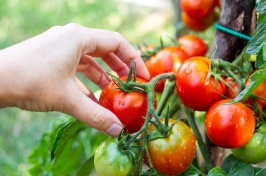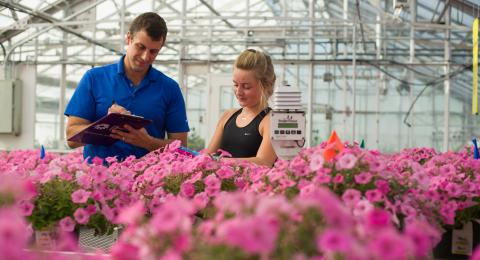
Since its establishment in 1887, the New Hampshire Agricultural Experiment Station (NHAES) has pioneered innovative research, nurturing sustainable solutions for agricultural, food, and environmental challenges, enriching every corner of the Granite State. Through pioneering interdisciplinary initiatives and state-of-the-art facilities, NHAES remains dedicated to propelling positive change, empowering communities not only within New Hampshire but also beyond its borders. Below, you'll discover news and information about just some of the NHAES research that has had wide-ranging impacts on agriculture and food production; natural resources protection and conservation; and nutrition, health and wellness across the Granite State and throughout the Northeast.
 Wednesday, January 07, 2026UNH researcher investigates whether sparrows increase dairy herd infection risksNew UNH research is seeking to address the levels of Campylobacter jejuni — a bacteria that can affect herd health as well as cause food-borne illness in humans — in dairy cows. Andrea Ayala, assistant professor of natural resources and the environment in the College of Life Sciences and Agriculture (COLSA), is focusing on the role small birds play in transmitting the bacteria to cows at dairy...
Wednesday, January 07, 2026UNH researcher investigates whether sparrows increase dairy herd infection risksNew UNH research is seeking to address the levels of Campylobacter jejuni — a bacteria that can affect herd health as well as cause food-borne illness in humans — in dairy cows. Andrea Ayala, assistant professor of natural resources and the environment in the College of Life Sciences and Agriculture (COLSA), is focusing on the role small birds play in transmitting the bacteria to cows at dairy... Tuesday, November 18, 2025UNH research focuses on extending the shelf life of fruits and vegetablesOnce the stem snaps at harvest, a race begins between biology and decay, and when produce begins to decay, farmers lose income, grocers lose stock, and consumers lose flavor. Researchers at UNH are exploring the complex process of ripening, with the goal of developing ways to maintain post-harvest firmness and flavor for far longer than currently possible. The research into preserving ripeness,...
Tuesday, November 18, 2025UNH research focuses on extending the shelf life of fruits and vegetablesOnce the stem snaps at harvest, a race begins between biology and decay, and when produce begins to decay, farmers lose income, grocers lose stock, and consumers lose flavor. Researchers at UNH are exploring the complex process of ripening, with the goal of developing ways to maintain post-harvest firmness and flavor for far longer than currently possible. The research into preserving ripeness,... Thursday, November 13, 2025UNH study pinpoints how to help a popular New Hampshire fishery remain viableThe New Hampshire Fish and Game Department calls striped bass “by far the most sought after fish along the New Hampshire coast,” and recreational anglers pursuing striped bass contribute more than $100 million to the Granite State’s economy and support more than 1,600 jobs. But annual surveys indicate that the population is in decline, threatening the major recreational and commercial fisheries...
Thursday, November 13, 2025UNH study pinpoints how to help a popular New Hampshire fishery remain viableThe New Hampshire Fish and Game Department calls striped bass “by far the most sought after fish along the New Hampshire coast,” and recreational anglers pursuing striped bass contribute more than $100 million to the Granite State’s economy and support more than 1,600 jobs. But annual surveys indicate that the population is in decline, threatening the major recreational and commercial fisheries... Wednesday, October 08, 2025A new direct marketing agreement rejuvenates decades-long private–public research and teaching connection in New HampshireIn September 2025, the Organic Dairy Research Farm at the University of New Hampshire (UNH) began shipping milk directly to the Stonyfield Organic processing facility in Londonderry, New Hampshire, a move that will further strengthen the more than 20-year partnership between the New Hampshire based company and the state’s land-grant university. The recent direct marketing agreement is also...
Wednesday, October 08, 2025A new direct marketing agreement rejuvenates decades-long private–public research and teaching connection in New HampshireIn September 2025, the Organic Dairy Research Farm at the University of New Hampshire (UNH) began shipping milk directly to the Stonyfield Organic processing facility in Londonderry, New Hampshire, a move that will further strengthen the more than 20-year partnership between the New Hampshire based company and the state’s land-grant university. The recent direct marketing agreement is also...
Upcoming COLSA & NHAES Events
There are no items to display.
See all upcoming COLSA events



